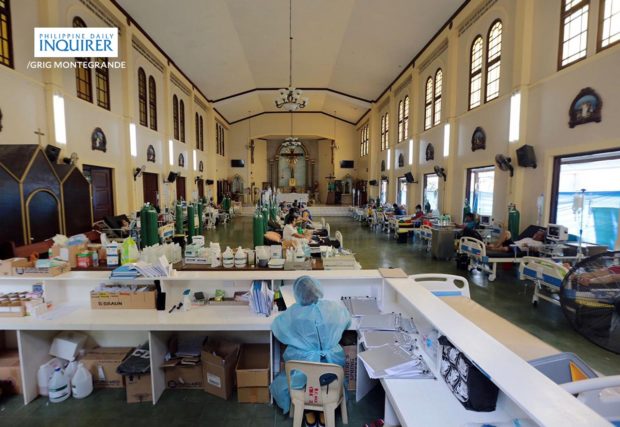‘Data governance’ missing in COVID response, aid distribution

Health workers attend to patients at the chapel of Quezon City General Hospital and Medical Center (QCGHMC) on Thursday, Aug. 19, 2021, as it converted the chapel into an intensive care unit (ICU) ward as a response to the increasing number of severe COVID-19 cases. (File p photo by GRIG C. MONTEGRANDE / Philippine Daily Inquirer)
MANILA, Philippines — Don’t they have a group chat?
According to an information technology expert, that is the constant question expressing public exasperation over the government’s COVID-19 response, which has been marked by conflicting policies of state agencies and which could have been solved through data-driven governance.
Speaking on Tuesday at a webinar hosted by the Department of Science and Technology, Ideacorp CEO Emmanuel Lallana took issue with the national government’s data governance, saying that “the people cannot exchange data quickly” and that “before the information is posted on the DOH (Department of Health) website, they need to double-check the lab reports.”
Lallana said that in 2020, the COVID response team of the University of the Philippines reported a number of “alarming patient level inconsistencies, if not gross errors in the data being reported by the DOH.”
He said that until today, data lag continued to be a problem because COVID data released on Tuesdays were actually the results of tests conducted on Sundays.
Such challenges in data management are happening not only in Third World countries, he said, adding: “Poor governance and institutional capacity gaps negatively impact the ability of the public health system to respond to pandemics.”
In the same webinar, Barangay Chairman Mario Montanez II of Bangkal, Makati City, said one of the biggest issues he had to face during the pandemic was the social amelioration program, in which the government issued financial aid according to demographic data based on the 2015 census.
“This is a reflection of the gap in data management and data governance that we are currently facing. If you are to collect data, and since technology is available, you have to collect all, and then establish a system of managing it,” he said.
Montanez also lamented the redundancy of certain orders from the national government, citing the directive in January of the Department of the Interior and Local Government that barangay captains create a database on vaccinated persons.
He said that since the vaccination was being done through the local government units (LGUs), they already had the data on the number of vaccinated individuals in their localities. But instead of passing through the LGUs, the order immediately went down to the barangay level.
“And if you don’t comply, then you will be put in question. So that is an example of wasted effort and misuse of data,” he said.
Interoperability
Lallana said that across government agencies, the lack of interoperability of data had also been the problem.
“If you have a whole-of-government framework of how we save data, and we have a common format [or system in place], it would be easier to share data,” he said. “Data governance is really a set of rules on how you collect and manage data, and you have some confidence that the data is of high quality.”
RELATED STORIES
Duterte lacks sense of urgency in COVID-19 response – Robredo
80% of Filipinos ‘approve’ of gov’t’s COVID-19 response — OCTA survey
IATF asked to ‘recalibrate, reassess’ COVID-19 response amid another lockdown